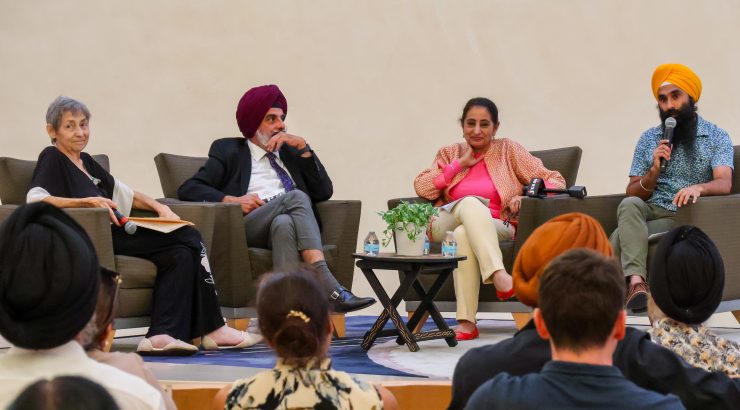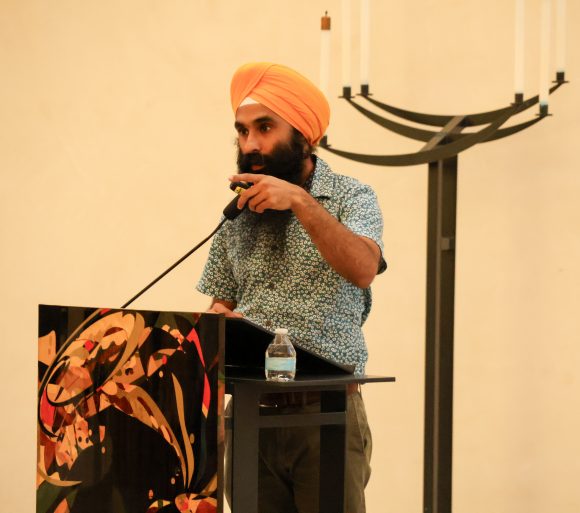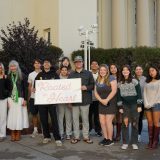
ETW: Health Equity: Lessons from the Field Reflected on the Inequities of the U.S. Healthcare System
September 19, 2023
Wilkinson College of the Arts, Humanities, and Social Sciences and Crean College of Health and Behavioral Sciences partnered with the Fish Interfaith Center and SIKHlens for an insightful ETW: Leading the Conversation on Health Equity event highlighting the perspectives of three healthcare professionals based in Orange, California and Seattle, Washington. Dr. Angad Singh, Dr. Jasjit Singh, and Dr. Gurpreet Ahuja drew on their unique experiences within the U.S. healthcare system to address a wide range of subjects, from the impacts of AI on access to healthcare to the uneven toll the COVID-19 pandemic took on economically disadvantaged communities of color.
Dr. Ahuja reflected on the inequities of the U.S. healthcare system, pointing to the nation’s lack of universal healthcare as the major cause. He shared the heartbreaking reality of many of his patients who face the steep cost of healthcare simply because they lack insurance. For some, this results in the inability to receive life-saving procedures or medications due to the cost. For others, it means the inability to access even regular doctor visits. It’s this reality that has greatly impacted Dr. Ahuja’s view that “healthcare is a right of every single American.”
Dr. Jasjit Singh drew on her experience as a pediatric infectious disease doctor and professor to offer an in-depth look into how the medical education system perpetuates health inequities. Dr. J. Singh stands as a reminder about the impact we as individuals can have in creating the necessary change for overcoming grave issues like health inequity. She has implemented changes in her teaching that seek to make her students—soon-to-be healthcare professionals—actively aware of biases that exist within themselves and the system. She provided a shocking example that less than 5% of images within dermatology textbooks are of non-white skin. This has greatly impacted the abilities of healthcare workers to recognize, diagnose, and treat people of various skin tones. This has adverse effects on the type of care people of color receive, which often harms their overall health. This is why Dr. J. Singh has incorporated images and curriculum centered on how diseases can present differently in darker skin tones into her classroom. Conscious steps like these, Dr. J. Singh asserts, are what will create the basis for change in America’s inequitable healthcare system.

(Left to right:) Janine Hill, Ph.D.Dean of Crean College of Health and Behavioral Sciences, Dr. Gurpreet Ahuja and Dr. Jasjit Singh. (Photo by: Ava Brandt)
Dr. Angad Singh echoed Dr. J. Singh’s call for a collective need to seek out solutions to America’s health crisis, stating health equity does not “just happen.” Rather, we need to be active participants in driving change in our nation if we want to see this health crisis properly addressed. Dr. A. Singh’s own work demonstrates the critical importance of community: connecting with members of his local Sikh community, he was able to encourage those initially hesitant to receive the COVID-19 vaccine to get vaccinated by talking them through hesitations they had. He was a trusted source for these individuals not only due to his education but largely because of his connection to the community and interest he took in them. Dr. A. Singh believes that this “people connection” is missing from America’s healthcare system and the need to bring it back, through innovative avenues like technological advancement, is key for tackling the formidable health inequity crisis.
“I learned of the importance of meeting people “where they are at.” Dr. Angad Singh’s work spoke to the importance of ensuring health equity can start and be quite successful with partnering with community members, ensuring that health practitioners understand cultural differences or may be members of certain communities and providing care in places that the community feels comfortable,” said Dr. Charissa Threat (Department of History).
This event set a strong foundation for the 2023 Engaging the World series on Health Equity, as we continue to delve into where the subject intersects with numerous other complex topics like environmental justice, food insecurity, and LGBTQ+ rights. The keynote event, Under the Skin with Linda Villarosa, is taking place on Tuesday, September 26 at 7 p.m. in the Musco Center for the Arts and will further this exploration into the realities of health inequity in America.
(Main header photo by Ava Brandt)


